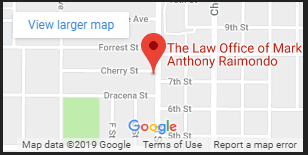BAKERSFIELD, Calif. (KGET) — A traffic stop that turned into an alleged use of excessive force by police is raising a big question: What are drivers’ rights when it comes to police encounters?
“It depends” is the closest thing to a definitive answer, per 17 News’ conversations with multiple legal experts.
The law, those experts said, protects police, but it also protects drivers.
But as one attorney put it, everything begins with the “premise of what stops a person.”
Here is a breakdown of Donte Heath’s case, the incident currently at the center of this debate in Bakersfield.
“Do you legally have to get out of your car? Probably not always,” said Bakersfield criminal defense attorney Mark Anthony Raimondo. “But it’d be a good suggestion just to follow along. Follow and comply and complain later is a great suggestion.”
Those are the questions raised by a traffic stop-turned-arrest that left a 50-year-old man allegedly with a broken elbow and rib.
In the early hours of New Year’s Eve, Donte Heath was pulled over by Bakersfield police officers for allegedly not wearing his seatbelt. But when Heath refused to get out of the car, things took a quick turn.
Heath’s attorney, Daniel Rodriguez, told 17 News his client didn’t comply with officers because he knew his rights.
“And is that wrong?” Rodriguez stated. “But the one [excuse] that cops, officers always fall back on is hey, officer safety. And the law says, hey wait a minute, is it reasonable to believe?”
He added: So, what does the officer write down [in his report]? [Heath] was belligerent… There’s no reason. There’s not an odor of alcohol on [his] breath. There’s no weapon, there’s no drugs. Nothing. You stopped [him] for a seatbelt violation. Here is [his] driver’s license, registration. End of story. Give me the citation and let me go home.”
Rodriguez said charges being recommended against Heath are resisting arrest, not wearing his seatbelt and not having a license plate in front of his car.
BPD declined to confirm those details. But the District Attorney’s Office confirmed with 17 News on Wednesday evening, they had received the case from the police. Ultimately, the district attorney will determine which charges, if any, to press.
Rodriguez pointed out: “I have doubt that the district attorney’s office will ever file criminal charges in this case … It’s pretty straightforward that it was not a good stop. And if there’s not a good stop, it’s not going to be a good case to prosecute criminally.”
By “good stop,” Rodriguez was referring to the legality of the traffic stop in the first place, which he argued because Heath allegedly was not wearing his seatbelt in a parking lot, the seatbelt law does not apply.
“He’s in the parking lot. There is no law that requires that you have your seatbelt on private property. Just on a public street,” Rodriguez said.
Earlier Wednesday morning, BPD Chief Greg Terry joined 17 News at Sunrise to discuss Heath’s case.
“The Supreme Court has ruled that an officer in a traffic stop, even for a minor traffic offense, can ask the driver, order the driver, out of a vehicle,” the chief said. “It also applies to passengers as well. Part of the logic behind it is the Supreme Court has recognized the inherent dangers in traffic stops.”
That Supreme Court case is Pennsylvania v. Mimms from 1977. Twenty years later, the ruling was extended to include passengers via a different court case.
Legal experts emphasize there must be evidence — a legitimate reason — as to why officers are asking someone to step out.
They said, for instance, an officer feeling threatened by a driver or passenger can request they step out. But they must have good reason to believe they’re in danger.
“All citizens have the right to remain unobscured by officers unless there’s a legal reason for them to stop you, question you and to look further,” said attorney Raimondo. “So always remain calm, make good eye contact, follow all lawful commands, if you have any legal doubts on what to do, ask for a supervisor.”
Full article: https://www.kget.com/news/local-news/traffic-stop-turned-arrest-sparks-debate-on-drivers-rights-during-police-encounters/amp/



